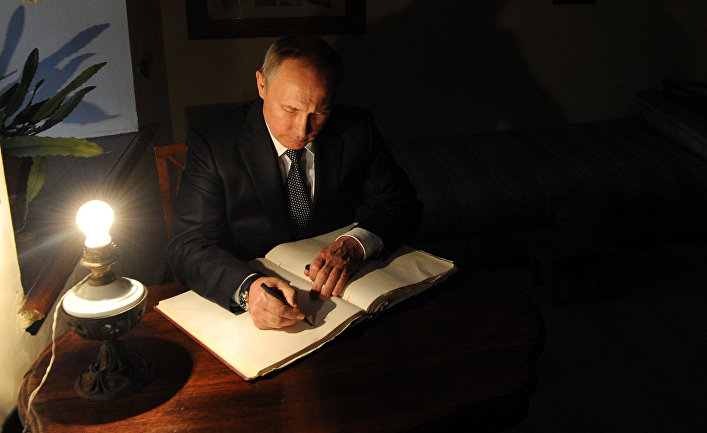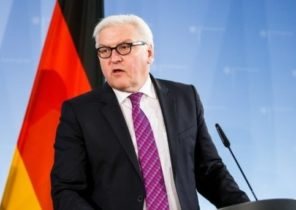
According to the latest reports, President trump is ready to ease the financial sanctions imposed by the US against Russia to improve bilateral relations. However, such measures will not bring substantial relief of the Russian economy. In addition, congressional supporters of the tough stance against Russia could hinder the Trump to bring his intentions to life.
It is also worth noting that the easing of these sanctions can hurt a number of economic interests of the United States.
President trump was a pretty low opinion of the financial sanctions that the Obama administration has imposed against Russia in connection with its aggression in Crimea and Eastern Ukraine.
Hardly anyone will be surprised if trump, in its sole discretion embody their intentions in life, not waiting until Moscow complied with the conditions of the Minsk agreement, as insisted by the EU leaders and many members of Congress. Those sanctions, which trump wants to cancel, affect the banking, energy and defense sectors of the Russian economy, as well as lead to visa bans and freezing of accounts of some influential Russians. These sanctions have been carefully coordinated with the European Union and approved by the U.S. Congress.
The lifting of sanctions against Russia will not only provoke political discord between the US and the European Union, but also put the international business community in quite a predicament. International companies will be obliged to comply with the sanctions imposed against Russia by the European Union. Therefore, banks and oil companies that operate in Europe and who had to leave Russia because of the sanctions, not to sign new deals with Russian companies that are under sanctions of the European Union.
But even those international investors who will be able to sign new contracts with Russia, might not want to do that. Attempts by the last two American presidents to reset relations with Russia failed. This attempt to improve relations with Moscow, too, can fail if Trump and Putin won’t be able to find a common language. In this case of international companies can be at risk.
Experience shows that the mitigation and abolition of financial sanctions, as a rule, does not bring instant relief. Companies have to deal with the remaining financial constraints, and they often are reluctant to make new investments. Those companies that tried to rebuild the business in Iran, Cuba and Myanmar, has faced serious challenges, but their success was limited.
In the case of Russia, if sanctions against it be lifted, the risks for the business community will not be hypothetical.
A group of senators, which included 10 members of both parties and chaired by Ben Cardin (Ben Cardin), John McCain (John McCain) and Lindsey Graham (Lindsey Graham), recently announced that they are preparing a new bill on sanctions against Russia. In the case of the adoption of this bill will cause the Russian economy is a much more tangible damage than sanctions. In addition, currently they are looking for ways to get trump to keep current sanctions against Russia.
Even if President trump will cancel the sanctions and will be able to keep an angry Congress under control, Russia still should not expect immediate economic surge.
The main blow on the Russian economy caused not sanctions, and a sharp drop in global oil prices in 2014. In addition, it suffers from mismanagement, unfavourable demographic situation in the country and weak growth. According to the world Bank, during the third presidential term for Putin, Russia’s GDP will grow by only 1% per year, despite the fact that the current volume of oil production in the country exceeds the record figures of the Soviet era.
In fact, the lifting of sanctions may even harm some sectors of the Russian economy. The cancellation will have a negative impact on oil prices. This will lead to a decrease in revenues from the sale of oil and to reduction of volume of cash flows. The profit from the sale of natural resources in Russia is almost half of the revenues of the Russian state.
The negative effects of the lifting of sanctions against Russia could affect the United States. The decline in world oil prices strike at U.S. oil companies seeking to maintain financial stability in a rather harsh market conditions. It will also negatively affect their ability to compete on the world market of raw materials. And speaking of natural gas, the lifting of sanctions will significantly worsen the position of American producers of liquefied natural gas on the world market.
In addition, in the event of cancellation of sanctions of the USA can lose some of its market share in other areas. Some regions, including the middle East, seeking closer ties with Russia.
Recently, for example, the Sovereign Fund of Qatar signed an agreement for the acquisition of a stake in Russian state energy company Rosneft. Freed from sanctions, Russia could be a much more attractive business partner than the US.
Immediate and obvious benefit that Russia will be able to extract from the lifting of US sanctions, is to split the transatlantic community in the issue of policy towards Russia and to increase Russia’s ability to project its influence on the world stage.
However, Moscow will still have to make great efforts to Fund their political adventurism. It is unlikely to encounter a powerful inflow of hard currency and low oil prices will have a negative impact on its capacity, authority and ability to threaten. In addition, after the lifting of sanctions Russia’s ability to manage its economy in the country or the world automatically improves.
President trump never said that he wants to get from Russia in exchange for the lifting of sanctions. Most likely, abolishing the sanctions, he will get in the face of Moscow exactly the same partner, as it is today, and will provoke serious divisions within the transatlantic Alliance. Moreover, the President trump will hurt the competitiveness of the U.S. economy.
Elizabeth Rosenberg is the Director of the Program in the field of energy, economy and security of the Center for a new American security.







